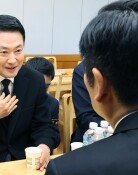End Politics in Arts and Culture
End Politics in Arts and Culture
Posted March. 20, 2010 06:47,
A coalition of progressive cultural organizations held a performance in protest of the now scrapped grand canal project before the inauguration of the presidential transition committee of the incumbent administration. They said in the performance, The project will destroy the countrys history and culture. To this, the then Culture Ministry sarcastically said, Such progressive organizations kept mum when the controversy arose that the original Sejong City plan presented by former President Roh Moo-hyun would destroy cultural assets. Kim Jeong-heon, who led the coalition from 1999 to 2007, was named chairman of Arts Council Korea at the end of the Roh Moo-hyun administration. It is no secret in the artistic and cultural circle that Culture Action and the higher-ranking organization Korean People Artist Federation had a role in replacing Kim Byeong-ik, the first chairman of the council, with Kim Jeong-heon. This was to take control of the domestic cultural community after the change of government.
The council exercises huge power by providing financial assistance worth 110 billion won (97.1 million U.S. dollars) to the artistic and cultural community. The fund includes not only government money but also profits from the sale of lottery tickets and tickets for concerts and exhibitions. The Korean people are unknowingly helping hungry artists. The former Roh government provided twice as many funds to the progressive Korean People Artist Federation than to the conservative Federation of Artistic and Cultural Organizations of Korea. Many criticized that this practice was unfair since the number of members of the former group was 100,000, while that of the latter was 380,000. In addition, the quality of works produced by the former was lower than that of the latter. In the provinces, the progressive cultural organization spent tax money to support like-minded politicians under the guise of cultural activities.
Kim Jeong-heon was fired after being found to have misused the culture and art promotion fund in December 2008. He fought his dismissal via a lawsuit and got a suspension of his firing. He began to coming to the councils office from Feb. 1 this year. A lower court ruled that the dismissal process of the Culture Ministry was misguided, leading to a situation in which one organization got two leaders. A higher court, however, overturned the decision, saying, The ruling undermines the possibility of prediction and legal stabilization in legal relations.
The higher courts decision cleared the confusion stemming from that of the lower court. The legality of Kims dismissal, however, has yet to be determined. His absurd office attendance performance has ended but the artistic and cultural community remains divided. Regardless of political inclination, forces who seek to use culture and art for political purposes must leave the sector and enter the political circle.
Editorial Writer Kim Sun-deok (yuri@donga.com)







